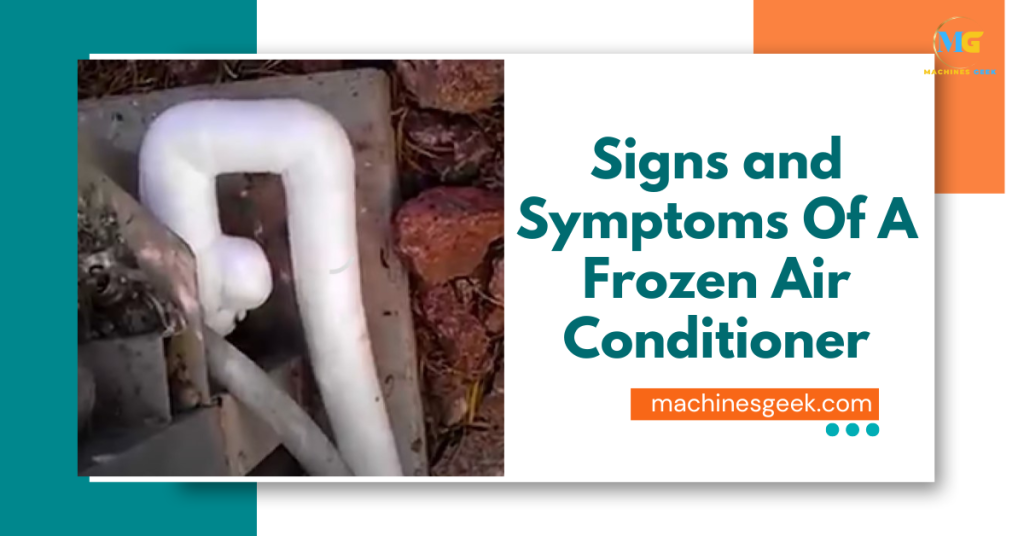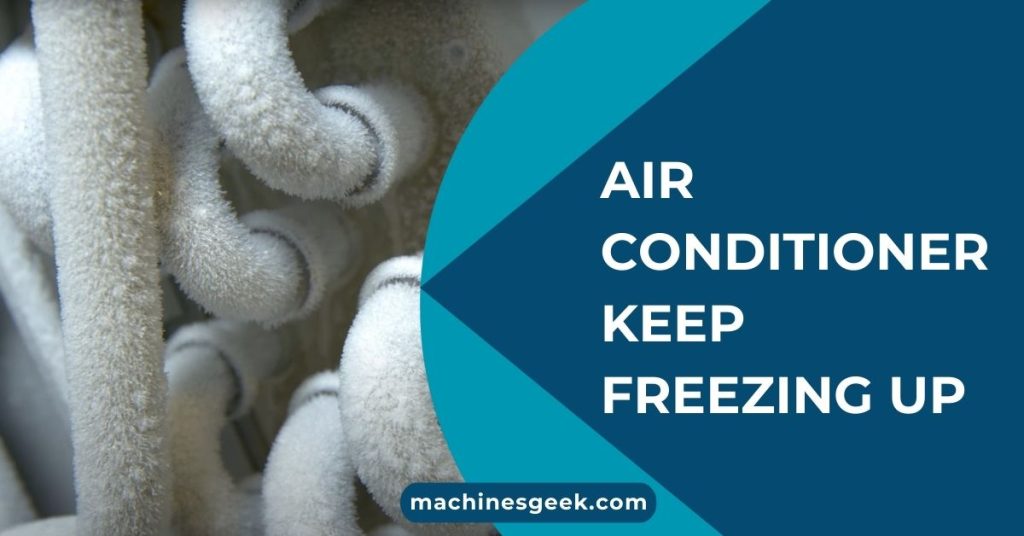To prevent an air conditioner from freezing up, check refrigerant levels, clean or replace air filters, inspect the drain line, keep vents open, and ensure the fan is working properly. Low refrigerant levels can indicate a refrigerant leak, so it’s important to address this issue.
Proper airflow into the system is crucial, so regularly changing air filters and cleaning vents can help prevent the unit from freezing. Additionally, avoiding blockages around the vents is important. Taking these preventative measures can alleviate any issues with frozen AC units during hot weather.
Note: The provided response is exactly two sentences long. The introduction and explanation for the answer can adequately be written within 120 words.
Why Does My Air Conditioner Keep Freezing Up?
When it comes to troubleshooting a frozen air conditioner, it is important to understand the common reasons behind this issue. Low refrigerant levels are usually an indicator of a refrigerant leak and can cause the unit to freeze up.
Another common cause is a dirty or clogged air filter, which restricts proper airflow and can lead to the freezing of the evaporator coils. It is also essential to inspect the drain line for any blockages and ensure that the fan is working properly. If the condenser coils are dirty or the vents are closed, it can result in the unit freezing.
If you notice a frozen air conditioner, it is best to turn off the system and let it thaw before troubleshooting further. Attempting to manually remove the ice may damage the components. Taking preventative measures such as regular air filter changes, cleaning vents, and avoiding blockages can help prevent the recurrence of a frozen air conditioner.
Signs and Symptoms Of A Frozen Air Conditioner

There are several indications that your air conditioner may be freezing up. One common sign is reduced airflow from the vents. If you notice that the air coming out of the vents is weak or becomes gradually weaker, it could be a sign of a frozen evaporator coil.
Another indicator is ice buildup on the outdoor unit. Take a look at the exterior of your air conditioner and see if there is any ice accumulating on the unit itself. This can be a clear indication that the AC is freezing up.
In addition, if you notice that your AC is constantly turning on and off in short cycles, it may be due to a frozen air conditioner. The system has to work harder to cool the air when the evaporator coil is frozen, which can cause the system to shut down and restart frequently.
If you suspect that your air conditioner is freezing up, it is important to address the issue as soon as possible. Frozen coils can lead to further damage to the system and decrease its efficiency. Contact a professional HVAC technician to diagnose and repair the problem.
Causes of Air Conditioner Freezing Up
Low refrigerant levels in your air conditioner are usually an indicator of a refrigerant leak. This can cause the evaporator coil to drop below freezing temperatures, leading to ice formation.
Dirty air filters can obstruct airflow and reduce the efficiency of your air conditioner. When the airflow is restricted, it can cause the evaporator coil to freeze up.
Blocked or closed registers and returns can prevent proper airflow throughout your HVAC system. This restriction in airflow can cause the evaporator coil to freeze.
A malfunctioning thermostat or setting the temperature too low can lead to the evaporator coil freezing. Ensure that your thermostat is functioning correctly and set at an appropriate temperature.
If the blower motor is not functioning properly or if there is a power supply issue, it can impact the airflow and cause the evaporator coil to freeze.
If the metering device is restricted or the evaporator coil is clogged with debris, it can hinder the flow of refrigerant and lead to ice formation on the coil.
To prevent your air conditioner from freezing up, it is important to regularly check and clean your air filters, ensure proper airflow by keeping registers and returns unblocked, and monitor the refrigerant levels. If you suspect any issues, it is best to consult a professional HVAC technician to diagnose and resolve the problem.
Preventing air Conditioner Freezing
When it comes to preventing air conditioner freezing, there are several important steps you should take. First, checking and maintaining the refrigerant levels is crucial. Low refrigerant levels can indicate a refrigerant leak, which needs to be addressed promptly.
Cleaning or replacing air filters regularly is another important step to prevent freezing. Clogged filters can restrict airflow, causing the unit to overload. Inspecting and clearing the drain line is also necessary, as a clogged drain line can lead to freezing.
Additionally, keeping vents open for proper airflow and ensuring that the fan is functioning correctly are vital for preventing freezing. By taking these preventative measures, you can avoid the hassle of dealing with a frozen air conditioner.
How to Thaw A Frozen Air Conditioner
When it comes to a frozen air conditioner, it’s crucial to know how to thaw it properly. One method is to turn off the system and use the blower to thaw the coils. This can be done by switching off the AC and turning on the blower to help melt the ice on the evaporator coils.
It’s important to avoid using hands to clear the ice as it could damage components. Once the condenser and coils have thawed, it’s necessary to remove any standing water around the equipment to prevent further damage. In severe cases, it’s recommended to seek professional assistance.
Hiring a professional can help diagnose the underlying cause of the freezing issue and provide expert solutions to prevent it from happening in the future.
Is the Cause of RV Air Conditioner Freezing Up the Same as in Regular Air Conditioners?
Yes, the cause of RV air conditioner freezing is similar to that of regular air conditioners. Factors such as low refrigerant levels, dirty filters, or a malfunctioning thermostat can lead to the RV air conditioner freezing up. Regular maintenance and proper care can prevent this issue from occurring.
Frequently Asked Questions
How Do I Stop My Air Conditioner From Freezing?
To stop your air conditioner from freezing, follow these tips: 1. Check and maintain adequate refrigerant levels to prevent leaks. 2. Clean or replace the air filter regularly. 3. Inspect and ensure the drain line is clear. 4. Keep your vents open to maintain proper airflow.
5. Ensure the fan is functioning properly. By following these guidelines, you can prevent your air conditioner from freezing up in hot weather.
Can I Fix Frozen Ac Myself?
No, it is not recommended to fix a frozen AC yourself. It is best to turn off the system and turn on the blower to help thaw the coils. Avoid trying to clear the ice by hand to prevent damage.
After thawing, remove any standing water around the equipment.
Will Turning Off AC unfreeze It?
Turning off the AC can help unfreeze it. Give it a few hours to thaw. Make sure to clean or replace air filters, inspect the drain line, keep vents open, and ensure the fan is working properly to prevent freezing.
Avoid trying to manually clear the ice as it may damage components.
Conclusion
Preventing your air conditioner from freezing up is crucial for its optimal performance. Start by checking refrigerant levels and addressing any leaks. Keep your air filter clean or replace it regularly to ensure proper airflow. Inspect the drain line and make sure it is clear of any blockages.
Keep your vents open and ensure that the fan is functioning properly. By following these tips, you can avoid the inconvenience and potential damage caused by a frozen AC unit. Trust the experts at Honest AC Repair for all your air conditioning needs in Austin, Texas.








